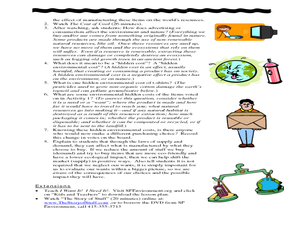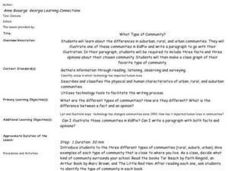Curated OER
Where the City Meets the Tree: Urban Forestry
Define the term "urban forestry"; discuss several problems facing urban forests today and both government and public efforts centered on developing and maintaining sustainable urban forests. Develop a feasible action plan for alternative...
Curated OER
Impervious Surfaces
Students comprehend impervious surfaces. They recognize the problems caused by impervous surfaces. Students observe how land use can influence impervious surfaces. They chose four of the seven basic land surface, students draw a picture...
Curated OER
Poetry SLAM: Youth Verse Competition
Use this model, based on urban youth poetry competitions, to create an engaging venue for your poets to share their work out loud, with expression. Build class community, have fun, and celebrate your authors' original verse....
Curated OER
Special Places in Our Community
Students compare and contrast cities whether they are large or small, rural or urban. They use digital photography to take pictures of the different types of cities.
Curated OER
Community
Second graders draw a picture. In this communities lesson, 2nd graders read the book Communities, and review as they read. Students use construction paper to create a picture of their houses in three different communities including...
Curated OER
Do It Write
Students investigate types of communities. In this communities lesson, students read the book The Country Mouse and City Mouse and identify the characteristics of the city and country. Students participate in a pen-pal program with a...
Curated OER
Reaching for the Sky
Students consider features of skyscraper using descriptive words, reflect on notion of skyscraper as orientation point in a city, and explore New York Times Building in Manhattan by reading and discussing article, "Pride and Nostalgia...
Curated OER
Geography, Ecology, and Folklife
Students identify how do geography and ecology influence a region's folklife. Then they investigate this question and consider how an outsider might view their own region in this instructional activity. Students also identify how the...
Curated OER
The Urban Heat Island Effect - Lesson 2 (Grade 5)
Fifth graders use the scientific process to examine how when various surfaces are exposed to similar environmental conditions, surface temperatures may vary. They conduct an experiment to show the relationship between surface and...
Curated OER
Modeling Reality
Students identify what a role model is and what characteristics such a person should possess. They discuss a new trend in character role model figurines, which some believe perpetuate racial and ethnic stereotypes.
Curated OER
Communities
The study of types of communties is the focus of this presentation. Details are given about the differences between rural, urban, and suburban communities. Use this presentation to provoke a class discussion about the various activities...
Curated OER
The True "Cost of Cool!"
Eighth graders study hidden environmental costs in things we buy. In this consumerism instructional activity students watch a video about consumerism and analyze advertisements in teen magazines.
Curated OER
Urban and Rural Communities
Students discuss similarities and differences of urban and rural communities. In this urban and rural communities lesson, students compare urban and rural communities using a Venn Diagram. Students examine maps of each type...
Curated OER
Homelessness
Students explore homelessness. In this speaking, listening, and critical thinking lesson plan, students listen to and discuss 3 scenarios in which families from urban, rural, and suburban communities became homeless due to...
Curated OER
What Type of Community?
Students compare and contrast suburban, rural and urban communities. They read books such as The Little Red Hen and identify the type of community in each book. Using computer software, they write about each type of community and...
Curated OER
A Tree Is More than a Street Name
Eighth graders discuss the role of trees as one of the most important natural resources. In groups, they examine how the forests nearby helped to shape their urban city. Using the internet, they research the use of the forest in early...
Curated OER
Where Do You Live?
Second graders study and compare rural, suburban, and urban communities. They play a board game, read books about communities, and complete several other activities regarding the different types of communities. Several extension and...
Curated OER
Alike and Different
Second graders listen to a book about how farms feed the world. They discuss elements of rural life. They listen to a story about the suburbs and discuss elements specific to a suburban community. They listen to a story about city...
Curated OER
Urban Planning: Plan a City
Pupils analyze the concept of urbanization by planning the placement of some of the major urban/suburban features that make up most cities. They arrange the cultural features to benefit the people who live there, and maintain respect for...
Curated OER
Design Your Own Suburb
Students view and discuss urban and suburban scenes; and list the features of their ideal town and discuss whether these features can be found in cities and suburbs. They draw mental maps of a city and a suburb and brainstorm and list...
Curated OER
The Industrial Revolustion
Students create artistic posters to show the differences between key vocabulary words. They show the differences between a rural, agrarian, urban, and industrial lifestyles. They evaluate the benefits and problems, the human and...
Curated OER
Letters from the Road
Students examine and differentiate between rural, urban, and suburban communities. They describe their local areas, view and discuss the images on the West Virginia Quarter, and write a friendly letter describing a camping trip.
Curated OER
Places We Live
Students compare/contrast rural and urban communities, and view and discuss the images on the Illinois quarter. They discuss Abraham Lincoln's life, complete a chart and a Venn diagram comparing urban and rural settings, and create a...
Curated OER
Consequences of Garbage
First graders consider the problem of too much garbage in America. In this garbage use lesson, 1st graders discuss ways to decrease garbage in the United States and complete a coloring sheet.

























